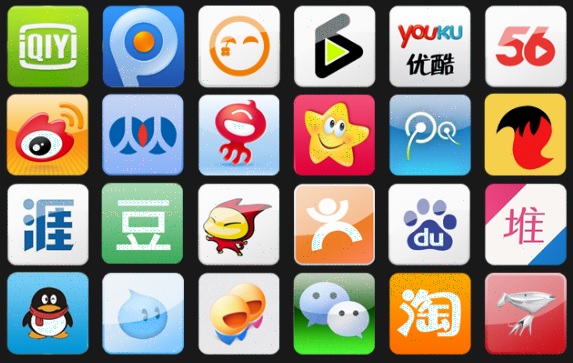Social Media in China
China has the largest number of internet users (1.02 Billion) in the world, making it an ideal target market for social media campaigns looking to make an impact. As China has only just begun to open up to Western ideas, however, the country’s social media landscape remains much different from that of the West, which can make marketing on Chinese platforms challenging and rewarding at the same time. Understanding how Chinese social media works can help you get your foot in the door and make your mark in one of the world’s fastest growing economies.
Social media has long been one of the most important communication channels in China, with the country now having the world’s largest number of social media users at over 983.3 million. As always, platforms are adapting and changing to meet users’ changing needs – both in China and around the world – and are often finding new success in the process. Social media has been huge in China since Weibo and WeChat became popular tools to share pictures, news, and ideas. According to studies, Chinese spend an average of 1 hour 57 minutes every day on social media.
China’s most popular social media platforms (including messenger apps) in 2024 is Weixin (Wechat) followed by Douyin (a hot tool that lets users create short videos that are often set to music) and Tencent QQ.
27 July, 2024
Social Media Statistics of China in 2024
With 1.02 billion internet users and the world’s largest social media population, China’s growing economy, booming technology sector, and thriving e-commerce scene make it one of the most intriguing markets in the world today. With more people than anywhere else in the world now using social media, its influence has never been greater—and no matter what industry you’re in, it’s important to keep an eye on what’s happening on Chinese social media if you want to stay ahead of the curve.
Social media has long been one of the most important communication channels in China, with the country now having the world’s largest number of social media users at over 983.3 million. As always, platforms are adapting and changing to meet users’ changing needs – both in China and around the world – and are often finding new success in the process. These days, social media statistics are easily accessible, but many businesses don’t realise that they can tell you more than simply how much time consumers spend on their favorite websites.
The number of Internet users in China has increased to 1.02 billion. There is a 3.6 percent increase over the previous year. The Chinese population has embraced social media in novel ways. China has a 70.9 percent internet penetration rate. Chinese people spend an average of 1.57 hours every day on social media. The number of social media users in China has risen to 983.3 million in 2024 as a result of massive internet access.
In China, social media is used by 68 percent of the population. In 2024, the number of active social media users increased by 5.6 percent, up 36 million from 2022. Social media has become one of the most crucial parts of regular internet use in China. People in China are rapidly moving away from desktop computers and toward mobile devices such as smartphones and tablets. People in China are increasingly using mobile devices such as smartphones and tablets instead of desktop computers.
In China, social media is used to bring people together, discuss issues, and express their views. New topics and conversations began to arise on social media in China on a regular basis. The following are some of the most fascinating social media statistics for the year 2024.
| Total population | 1.450 billion |
| Active social media users | 0.983 billion |
| Number of Internet users | 1.020 billion |
| Number of Mobile Internet users | 0.929 billion |
Smartphone prices have decreased in recent years, leading in an increase in smartphone usage across China. The availability of fast internet at very reasonable prices is another factor contributing to China’s enormous adoption of social media. China now has over 929 million mobile Internet users, accounting for 91.1 percent of all Internet users.
| | Percentage | in Numbers |
|---|---|---|
| Annual growth in active social media users. | 5.6% | 53 million+ |
| Annual growth of Internet users | 3.6% | 36 million+ |
According to social media user stats, the number of active social media users increased by 5.6 percent last year, with about 53 million new users added. As a result, a number of social media trends in China are expected to expand in the next months. The annual increase in Internet users is 3.6 percent, with additional 36 million+ new users.
| Average daily time spent using Internet | 5 hours 15 mins |
| Average daily time spent using social Media | 1 hours 57 mins |
In China, the average daily time spent on the Internet is 5 hours 15 minutes, with social media accounting for 1 hour 57 minutes of that time.
Social media in China has evolved greatly in the past 10 years with more than half of the country’s population joining social networking sites to communicate with their friends and family through text messaging, short video clips, and voice messages. Nowadays, Chinese people don’t just use social media to communicate – they also use it to shop and share pictures of themselves and their families. And with more than 1.02 billion internet users, it’s no wonder why marketers all over the world are interested in learning about the various social media platforms in China.
China Social Media Platforms
How WeChat dominates China
WeChat, meanwhile, is one of China’s biggest messaging apps and includes features like group chats, video calls and mobile payments. It’s owned by Tencent Holdings Ltd.
Tencent’s messaging app was already China’s dominant social network, but it keeps adding new features that bring users back for more. As a platform, WeChat is kind of like China’s version of Facebook, Twitter and LinkedIn all wrapped into one. For example, you can use it to order food from restaurants or buy movie tickets. You can pay friends back with WeChat Wallet and even play mobile games (some developed by Tencent). And now, you can even send money to friends using your voice! In fact, Tencent has so many people using its products—more than a billion daily active users—that if it were a country, it would be just behind China itself as one of the world’s largest markets.
A look at Weibo, Baidu Tieba, Douyin and more
Weibo is one of China’s most popular social networking platform. Launched in 2009 and known as China’s Twitter, Weibo lets users publish short-form content and leave comments on others’ posts. More recently, it has also become a hub for live-streaming broadcasts; Twitch acquired Chinese live-streaming platform Huya for $535 million just a few months after Sina Corp., which runs Weibo, purchased its main competitor YY Inc. for $1 billion USD. Baidu Tieba was created by search giant Baidu Inc.; similar to Reddit or Digg, users can post links or photos from around the web (or elsewhere) on topics ranging from sports to politics. Douyin (also called TikTok) is a mobile app that allows users to create 15-second videos using special effects and music tracks from China’s top artists—who receive royalties based on how often their songs are used—and share them online.

Most Popular Social Media Platforms in China 2024
Social media has transformed the way people interact, and it has been especially transformative in China. With about 983.3 million social media users in China as of 2024, the country has the largest number of social media users in the world. There are many popular social media platforms used in China, such as WeChat, QQ, and Sina Weibo. Social media has been huge in China since Weibo and WeChat became popular tools to share pictures, news, and ideas along with Douyin—a hot new tool that lets users create short videos that are often set to music.
And because most Chinese netizens use multiple platforms at once, it’s easy to find yourself with several social media accounts that you check regularly. Here’s a look at some of China’s most popular social media platforms right now.
| Top Social Network Platforms in China | Percentage | Active Users (in million) |
|---|---|---|
| Douyin | 70.20% | 716.04 |
| Baidu Tieba | 57.00% | 581.40 |
| Sina Weibo | 50.70% | 517.14 |
| Xiaohongshu | 47.90% | 488.58 |
| Kuaishou | 45.70% | 466.14 |
| Qzone | 34.40% | 350.88 |
| Meipai | 28.00% | 285.60 |
| Douyin Huoshan | 23.60% | 240.72 |
In 2024, Douyin is the most used social media platform in China, with 70.20% of social media users (716.04 million) joining. China’s version of TikTok is called Douyin. Many social networks in the Asian country are restricted, and TikTok is no exception. They restrict content from the rest of the world from being accessed in China in this way.
Baidu Tieba is ranked second on the list, with 57.00 percent of social media users in China. Baidu Tieba is a popular Chinese communication platform that is hosted by Baidu, a Chinese web services firm. On December 3, 2003, Baidu Tieba was founded. It’s a social media platform that mainly utilises Baidu’s search engine.
Chinese microblogging site, Sina Weibo (50.70 percent penetration) and Xiaohongshu, referred as China’s Instagram (47.90 percent penetration) are two other popular social media platforms in China, followed by a video-sharing mobile app, Kuaishou (45.70 percent). With 34.40 percent penetration, Qzone (a platform for blogging) is next. Meipai, a video community for women to share their lives in a safe and loving environment has 28.00 percent penetration and last on the list is Douyin Huoshan (23.60 percent penetration)
*Note: YouTube was not offered as an answer option in the survey.
Popular Chinese Messenger Apps 2024
| Popular Messenger Apps in China | Percentage | Active Users (in million) |
|---|---|---|
| Weixin (Wechat) | 77.00% | 785.40 |
| 61.50% | 627.30 | |
| I Message | 21.80% | 222.36 |
In China, the most popular messaging app is Weixin (Wechat). Developed by Tencent in 2011, Wechat is a Chinese instant messaging, social media, and mobile payment app. It has 77.00 percent of the country’s total users, or 785.40 million. QQ, again developed by Tencent, is the second most popular app on the list, with 61.50 percent penetration (627.30 million users). With 21.80 percent penetration, I Message (222.36 million users), an instant messaging service created by Apple Inc., comes in third.
Most Used Devices in China 2024
| Device | Percentage |
|---|---|
| Mobile Phone | 64.32% |
| Laptop & Desktop | 34.82% |
| Tablet | 0.86% |
With a share of 64.32 percent in 2024, the Mobile Phone is the most used device in China. The next device on the list is the Laptop & Desktop, which has 34.82 percent of the vote, followed by the tablet, which has 0.86 percent.
Search Engine Market Share in China 2024
| Search Engines | Percentage |
|---|---|
| Baidu | 86.82% |
| Bing | 3.94% |
| 2.22% | |
| Yandex | 0.17% |
| Yahoo | 0.02% |
| Ecosia | 0.01% |
| Others | 6.82% |
Baidu is the most used search engine in China in 2024. Baidu has a market share of 86.82% percent, indicating that it is the market leader. With 3.94 percent, Bing is the second most popular search engine in China. Google (2.22 percent), Yandex (0.17 percent), Yahoo (0.02 percent), Ecosia (0.01 percent) are the other search engines used in China.
Most Popular Browser in China
| Browser | Percentage |
|---|---|
| Chrome | 50.86% |
| UC Browser | 11.56% |
| Safari | 10.53% |
| Microsoft Edge | 4.06% |
| Firefox | 2.90% |
| Samsung Internet | 0.42% |
| Opera | 0.22% |
| Others | 19.45% |
Google-developed Chrome is the most popular browser in China with a share percentage of 50.86. UC Browser comes in second with 11.56 percent of the market share, followed by Safari (10.53 percent) then Microsoft Edge (4.06 percent ). Firefox (2.90 percent), Samsung Internet (0.42 percent), and Opera (0.22 percent) are the next most popular browsers on the list.
Most Visited Websites in China in 2024 (Alexa)
| Tmall.com |
| Baidu.com |
| Qq.com |
| Sohu.com |
| Taobao.com |
According to Alexa website, the top website in China is Tmall.com. Second, on the list is Baidu.com followed by Qq.com, Sohu.com and Taobao.com.
Top Mobile Apps in China 2024
| App Name | Parent Company |
|---|---|
| Weixin (Wechat) | Tencent |
| Douyin | Bytedance |
| Pinduoduo | Xunmeng |
| Alipay | Ant Financial Service Group |
| Kuaishou | Kuaishou |
The top mobile apps in China are Weixin (Wechat), followed by Douyin, Pinduoduo, Alipay and Kuaishou.
(Source: Data Reportal)
READ: Singapore Social Media Statistics
Disclaimer: The data research report we present here is based on information found from various sources. We are not liable for any financial loss, errors, or damages of any kind that may result from the use of the information herein. We acknowledge that though we try to report accurately, we cannot verify the absolute facts of everything that has been represented.








